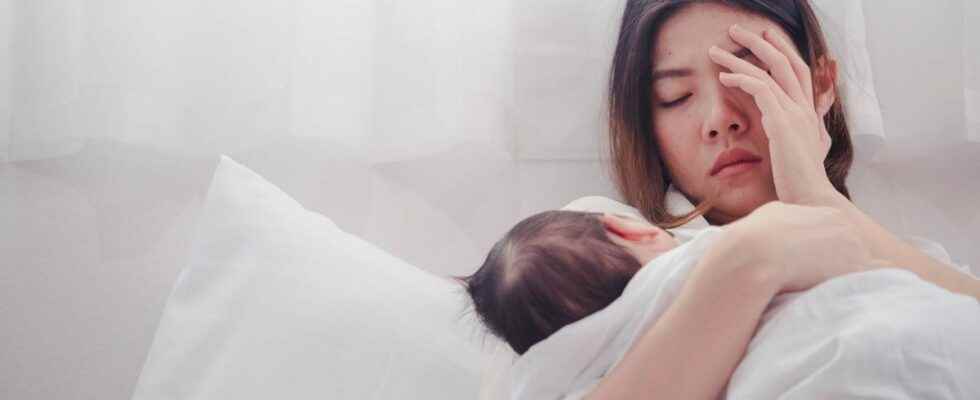Published on
Updated
Reading 3 mins.
Postpartum depression affects between 15 and 30% of women after giving birth. For the time being, no specific treatment is available in France. In the United States, there is a heavy treatment, which consists of an intravenous injection. The first treatment with tablets could be authorized next summer by the Food and drug administration (FDA). The opinion of Odile Bagot, gynecologist member of the committee of experts of Doctissimo.
Affecting around 100,000 women every year, postpartum depression is different from the baby blues.
- The baby blues is characterized by crying, mood swings and significant fatigue a few days after the child’s arrival, around the 3rd day of birth. With care and support adapted to maternity, this “slack” passes quite quickly, after a few days or weeks.
- Postpartum depression is a deeper ailment, with depressive and anxious symptoms such as mood swings, feelings of discouragement, persistent headaches or abdominal pain, isolation, and sometimes impulse phobias, with fear of doing hurt her child.
Only one existing treatment for the moment in the United States
Faced with this type of depression, only one drug called Zulresso is available in the United States, it consists of an infusion administered intravenously for 60 consecutive hours. But US health authorities are now on the verge of approving the first-ever pill specifically designed for women with postpartum depression.
Zuranolone is an antidepressant, which patients only need to take for two weeks, one tablet a day. Zuranolone is part of a class of drugs that target GABA receptors in the brain using a substance called a neurosteroid. Drugmakers Sage Therapeutics and Biogen said the US Food and Drug Administration has accepted a marketing application and could approve the drug by August 6.
NO to diets, YES to WW!
Phase 3 clinical study yields encouraging results
In the phase 3 randomized study, participants were women who were less than six months postpartum and had a major depressive episode that began in the third trimester of pregnancy or before birth. to have exceeded one month after childbirth. Participants received a dose of 50 mg daily or a placebo.
Result: those who received the molecule said they felt better after three days compared to those on placebo.
The researchers also used a measurement scale, called the Hamilton scale, to assess their depression. A score of zero to seven is considered normal, while a score of 20 or more (indicating moderate severity) is generally required to enter a clinical trial.
- Women who received zuranolone every night for two weeks experienced a greater reduction in scores on this Hamilton scale than women who received a placebo pill. At 15e day, the mean reduction in HAMD scores was 15.6 in women receiving zuranolone versus 11.6 in the placebo group.
- At 45e day, women treated with zuranolone continued to show a greater reduction in HAMD scores than women receiving placebo, with a drop of 17.9 points versus 14.4 points.
The opinion of Odile Bagot, gynecologist member of the Doctissimo expert committee
“In France, there is no medication for postpartum depression, it must be treated with antidepressants and psychotherapy follow-up. Moreover, we are gradually returning to the dogma of antidepressant treatments which would not be effective over short periods of time and not before a fortnight of intake. I regularly prescribe patients with premenstrual dysphoric disorder 15 days of antidepressants, which they take before the start of their cycle and it works very well. This opens up prospects for a flash treatment of the same type, concerning postpartum depression, with psychotherapeutic support.“.
